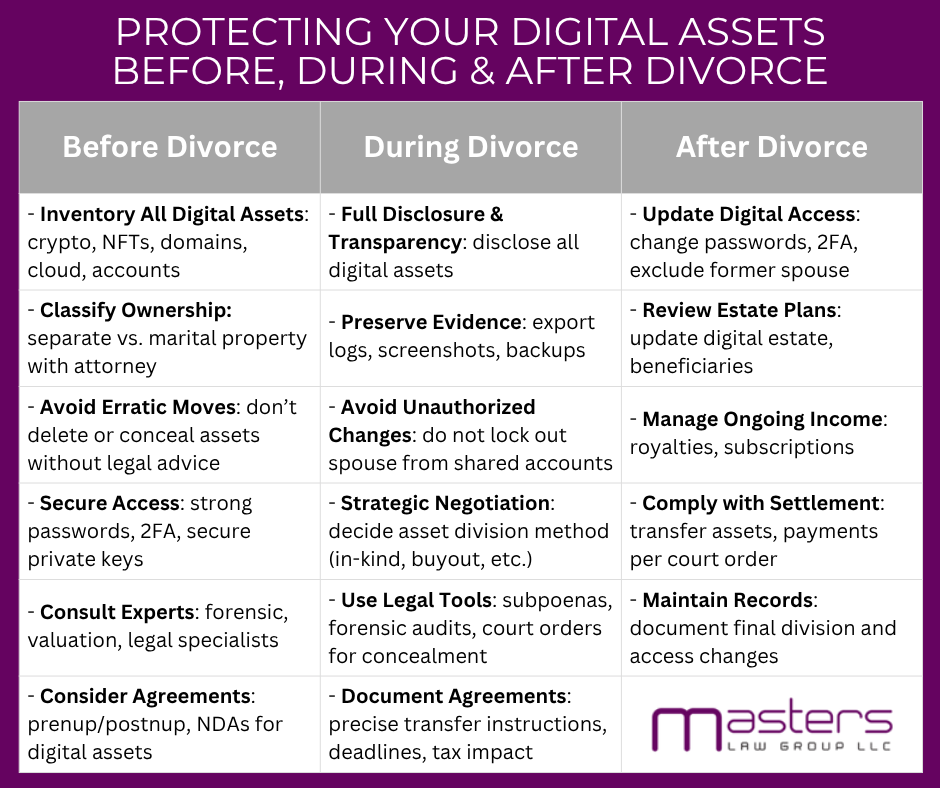Protecting Your Digital Wealth Before, During, and After Divorce
In today’s interconnected, digital-first world, many of the most valuable and vulnerable aspects of your wealth may exist online. From cryptocurrencies and NFTs to online businesses, domain names, cloud storage, and intellectual property, digital assets are ever more common and ever more complicated when it comes to divorce.
At Masters Law Group, we guide clients through the complexities of dividing traditional and digital assets alike. Below, we explain what “digital wealth” means, why it matters in divorce, and the practical steps you should take now to safeguard your interests.
What Is Digital Wealth
When people think of marital assets, they often imagine houses, retirement accounts, investment portfolios, and physical property. But digital wealth encompasses a broad, evolving spectrum of assets, many of which have monetary, strategic, or sentimental value. Some examples include:
- Cryptocurrencies and tokens (e.g., Bitcoin, Ethereum, stablecoins)
- Non-fungible tokens (NFTs): digital art, collectibles, virtual real estate
- Online businesses or side hustles: e-commerce shops, subscription sites, monetized blogs, SaaS platforms
- Domain names, websites, digital app assets
- Digital intellectual property: copyrights, trademarks, royalties, software code
- Cloud storage/archives: photos, videos, personal files
- Email, social media, and communications accounts
- Gaming accounts, in-game currencies, or virtual goods
- Subscription services, loyalty points, digital wallets, payment apps (PayPal, Venmo, Square, etc.)
- Access rights and credentials: login credentials, private keys, password-protected accounts
These digital assets can hold significant value (sometimes hidden value), or they may represent streams of income or strategic leverage. Because they can be more opaque and portable than traditional assets, they can be targeted for concealment or misallocation during a divorce.
Courts increasingly recognize digital assets as part of the marital estate. For instance, state divorce laws generally require full disclosure of all assets, including digital property.
Failing to properly identify, value, or protect digital assets can lead to:
- Loss of control over important accounts and files
- Undervaluation or improper division
- Accusations of concealment or spoliation
- Difficulty in reconstructing or recovering assets later
- Tax complications
Therefore, anyone navigating divorce must treat their digital wealth with the same seriousness, and often more care, than physical or financial assets.
Key Challenges With Digital Assets in Divorce
Before we go into drafting your action plan, it helps to understand the unique challenges digital assets present:
1. Opacity and Concealment Risk
Because digital assets can be held under pseudonyms, encrypted wallets, or obscure accounts, they are easier to hide. A spouse could transfer cryptocurrency to a new wallet or move assets to offshore or anonymous accounts, making detection difficult.
2. Volatility and Valuation Complexity
Cryptocurrencies, especially, are extremely volatile. Their value may swing dramatically even within days. NFTs are subject to speculative pricing and illiquid markets. For online businesses, you often must value future income, user base metrics, growth potential, and intangible goodwill in addition to hard assets.
3. Intermingling/Commingling
Even if you brought a digital asset (say, a Bitcoin wallet) into the marriage, if you used marital funds to enhance it, or mixed it with assets acquired during marriage, courts may consider the increased value or proceeds part of marital property.
4. Access and Control Issues
Ownership of a digital asset often depends on who controls the keys, credentials, or servers. Transferring, locking out, or restricting access to accounts can lead to disputes or court orders.
5. Evidence Preservation
Deleting data, altering logs, or revoking access mid-divorce can be construed as spoliation of evidence, which can trigger penalties or imputed value.
6. Evolving Legal Landscape
Digital assets are relatively new in divorce practice, so courts are still developing standards. Judges and attorneys may vary in how they treat specific asset categories.
A Step-by-Step Plan to Protect Your Digital Wealth
Below is a strategic roadmap to help protect your digital assets before or early in the divorce process. Always consult with a family law attorney (such as a team at Masters Law Group) before making any moves that might complicate your case.
1. Inventory Everything
Begin by building a detailed, documented inventory of all your digital assets. Be comprehensive. Include:
- Asset type (crypto, NFT, domain, business, cloud files, etc.)
- Platform or service (exchange, marketplace, hosting, blockchain)
- Account name, username, email, server, host, wallet addresses, public keys
- Access methods (passwords, 2FA, hardware wallets, recovery seeds)
- Purchase history and transaction logs
- Dates acquired, cost basis, current holdings
- Any associated liabilities (loans, margin, obligations)
Don’t forget less obvious digital holdings like app store accounts, digital royalties, loyalty or rewards points, or gaming items.
Documenting as much as possible early locks in the “starting point” and protects you from later accusations of hiding or changing things.
2. Classify and Understand Ownership
With your attorney, you’ll need to classify which digital assets are separate property (not subject to division) versus marital property (subject to division under applicable state law).
Separate property typically includes assets you owned before marriage, gifts or inheritances to you alone, or assets explicitly excluded by agreement. Even separate digital assets can lose their separate status if commingled or enhanced by marital funds or efforts.
It is important to understand your state’s rules on equitable division or community property and how they apply to digital assets.
3. Don’t Panic, Avoid Erratic Account Moves
It may be tempting to immediately move things or change access to “secure” your assets. But doing so in a divorce context may backfire.
- Avoid deleting, wiping, or altering data once divorce may be imminent; it can appear as spoliation.
- Consult your attorney before making account changes, especially for shared or jointly held accounts. A court may require that you not alter account access mid-litigation.
- If account access is shared, don’t unilaterally lock out your spouse unless ordered. Courts may view that as “tampering.”
4. Secure Your Access
Once you’ve documented and your attorney gives the go-ahead:
- Change passwords on accounts that are solely yours (not shared)
- Enable or strengthen 2FA (two-factor authentication) wherever possible
- Move private keys or recovery seeds to secure storage (e.g., hardware wallets or secure offline backups)
- Consider creating new email accounts for legal/financial correspondence (so that old shared accounts cannot affect you)
- Back up important digital files or archives on external drives you control (but do so without triggering suspicion)
Always coordinate with counsel; avoid drastic changes to shared accounts that might be seen as hostile or obstructive.
5. Engage Forensic/Technical Experts Early
The complexity of digital assets often demands expert help:
- Forensic accountants or cryptocurrency tracing specialists can help trace transfers, inspect blockchain activity, recover deleted files, or identify hidden wallets.
- Valuation experts can provide reliable, defensible appraisals of volatile or intangible digital assets such as NFTs, online businesses, or intellectual property rights.
- IT security/network forensics can review whether there’s tampering, unauthorized access, or hidden accounts.
Engaging experts early provides both you and your attorney a baseline, reduces surprises, and sends a message that you are taking matters seriously.
6. Consider Pre- or Post-Nuptial Agreements
If you’re approaching divorce but are still married, it may be worth exploring protective tools:
- Prenuptial agreement (if you’re not yet divorced) or postnuptial agreement (entered after marriage) can explicitly define ownership and treatment of digital assets in a future divorce.
- Separate legal entities (e.g., LLCs, corporations, trusts) may hold digital assets, create separation from personal property, and strengthen claims that the assets are business or intellectual property rather than purely marital.
- Confidentiality/non-disclosure agreements might help protect the value or sensitive information about business or IP assets during the proceedings.
These instruments can’t cure all problems, but they can make supervision and enforcement clearer.
7. Negotiate & Strategize Early
Digital-asset divisions are rarely straightforward splits. You and your attorney should strategize which assets to keep, which to liquidate, and how best to compensate the other spouse fairly. Some common frameworks include:
- In-kind distribution: dividing a digital asset itself (e.g., splitting a fungible token). This works well for cryptocurrencies that can be subdivided.
- Buyout / Offset: one spouse keeps the digital asset, and compensates the other with cash or other assets of equal value.
- Liquidation/sale + divide proceeds: sell the asset and split the cash. This avoids ongoing management or volatility concerns, but timing and tax consequences matter.
- Continued ownership + compensation mechanism: perhaps one spouse keeps the digital business and pays the other over time or with royalties or profit shares.
Whatever approach you choose, your agreement should clearly state the valuation date, the method of valuation, who bears tax risk, and mechanisms for transfer or enforcement.
8. Preserve Digital Evidence
To help defend your rights and protect from claims of hiding or tampering, preserve evidence:
- Take screenshots of current account balances, holdings, wallet addresses, and transaction logs
- Export CSVs or PDFs of statements, trade histories, and tax filings
- Keep copies of backups (offline)
- Document any suspicious activity or impulse changes
- Provide logs or metadata (dates, timestamps, IP addresses) where available
- Avoid deleting or altering anything once litigation is likely
Courts often respond harshly to parties who alter or destroy digital evidence.
9. Ensure Transparency and Full Disclosure
While you’re protecting your rights, you must also comply with your legal duty to disclose assets fully and in good faith. Non-disclosure or concealment can lead to sanctions, a greater share awarded to the other spouse, or reversal of transfers.
Your attorney can help you craft discovery responses, responses to interrogatories, and documentation that include your digital asset inventory.
10. Draft a Clear Agreement or Court Order for Transfer
Digital assets often require complex transfer instructions. A settlement or court order should clearly:
- Name the digital property being transferred
- Provide wallet addresses, keys, and credentials
- Set a timeline or a supervised mechanism for transfer
- State who bears fees, risks (e.g., volatility, network fees, lost keys)
- Address tax consequences
- If necessary, require escrow or third-party oversight of the transfer
Well-drafted orders reduce disagreements post-decree.
11. Post-Divorce: Update Your Digital Estate & Access Plans
Once the divorce is final:
- Update beneficiaries, permissions, or access to digital accounts
- Change login credentials, passwords, and 2FA to exclude your former spouse
- Review and update your estate plan or digital-asset instructions
- Ensure proper handling of ongoing income streams (royalties, ad revenue)
Case Study: Crypto & Online Business
To illustrate, consider this composite (fictional but realistic) scenario:
Jane and Alex have been married for 8 years. During the marriage, Jane bought various cryptos and NFTs (some pre-marriage, some during). She also built a subscription-based content website that generates steady ad revenue. Alex suspects that Jane has hidden additional crypto holdings in a cold wallet.
How Jane should proceed:
- Inventory all known wallets, exchanges, transaction logs, website accounts, domain registrations, revenue statements, and archives.
- Preserve evidence by exporting all statements, screenshots, backups, and metadata.
- Avoid hiding or moving more funds once Alex has indicated the intention to divorce; doing so may be reversed or penalized by the court.
- Engage experts: a blockchain forensic specialist to address Alex’s suspicion of hidden crypto, and a business valuation expert to value the subscription site.
- Negotiate: Jane may propose keeping the site and paying Alex a buyout, or splitting crypto holdings fungibly, or liquidating a portion and dividing proceeds.
- Document transfer in settlement: including wallet addresses, private keys (in escrow or supervised), timeline, tax allocation, and liability assumptions.
- Post-divorce cleanup: Jane updates credentials, secures access. Alex receives compensation per the agreement.
Through proactive steps, Jane can reduce disputes, maintain control, and protect her interests, while still complying with legal disclosure obligations.
What Happens If Your Spouse Tries to Conceal Digital Assets?
Sometimes, even with your best efforts, the other spouse may attempt to hide or move digital assets covertly. Here’s how the legal system can help you:
- Discovery tools: Your attorney can issue subpoenas, requests for production, interrogatories, or forensic inspections of devices, email, cloud servers, and exchange accounts.
- Blockchain tracing: Forensic accounting experts can trace transfers on public blockchains and detect suspicious movement patterns.
- Court orders/sanctions: Courts can order asset freezes, preservation orders, or require credential disclosures. They can also impose monetary sanctions, adverse inference (imputing hidden value to the concealing spouse), or even award the entire asset to the other party.
- Imputed value: If a spouse fails to preserve or disclose, the court may impute a higher value or assign the disputed value to the non-offending party.
- Forensic audits: In complex cases, the court can appoint neutral forensic experts to audit digital records.
These tools help level the playing field, even when one party has a technical advantage.
Your Digital Asset & Divorce Timeline
Remember: Digital assets are complex and require careful legal and technical handling. Consult family law attorneys experienced in digital property to protect your interests throughout the divorce process.
Common Questions & Pitfalls
Q: Can I just change all my passwords and lock my spouse out?
A: Not always. Changing passwords on accounts you alone own might be okay, but unilateral changes to shared or marital accounts can be viewed by courts as tampering or concealment. Always coordinate with your attorney before drastic account changes.
Q: Are digital assets always marital property?
A: No. Assets acquired before marriage, inherited, or gifted (if not commingled) may remain separate. But courts look carefully at commingling, efforts, and how the value changed during the marriage.
Q: How is crypto valued?
A: Typically, courts pick a “valuation date” (e.g., date of separation or date of filing) and use a market reference (exchange price or average). Crypto volatility is taken into account; parties often negotiate valuation windows or averaging periods.
Q: What about NFTs?
A: NFTs (non-fungible tokens) are treated like unique property. Because they lack fungibility, division often occurs via transfer to one spouse with offsetting compensation to the other. Valuation is often market-driven and can be speculative.
Q: My spouse ran a digital business we built together. How should that be divided?
A: You’ll need a business valuation expert. Options include one spouse keeping the business in exchange for buyout payments, splitting the value, or even continued joint ownership (rare). Your settlement should specify who keeps the platform, content, domain registrations, user databases, and intellectual property rights.
Q: Can the court force password or private key disclosure?
A: Yes, courts can order parties to produce credentials or key access, sometimes under protective conditions. They may also appoint custodians or escrow agents to enforce fair transfer.
Final Thoughts
In the digital age, your wealth extends beyond bricks and mortar; it spans blockchains, servers, domains, and data. If you’re approaching divorce, protecting your digital wealth isn’t optional; it’s essential. Mistakes or omissions can cost you significant value, privacy, or leverage.
At Masters Law Group, we help our clients:
- Build comprehensive digital asset inventories
- Coordinate secure and lawful access changes
- Engage forensic and valuation experts
- Negotiate transfer mechanisms and settlement terms
- Enforce proper disclosure and mitigate concealment risks
- Plan post-divorce digital cleanup and estate security
Every divorce is unique, and your digital asset plan must be customized. Let us help you protect your rights, preserve your legacy, and move forward confidently.
Get in touch with Masters Law Group today for a consultation.
Disclaimer: This blog is for informational purposes only and does not constitute legal advice. If you need legal assistance, please contact the qualified attorneys at Masters Law Group. Our firm can help you handle your family law case in Illinois, including divorce, custody, and mediation services.

















